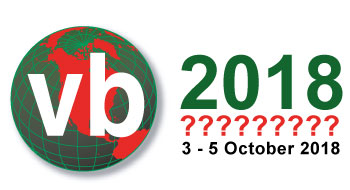Posted by Martijn Grooten on Jul 26, 2017
 Today, we open the call for last-minute papers for VB2017. Submit before 3 September to have your abstract considered for one of the ten slots reserved for 'hot' research.
Today, we open the call for last-minute papers for VB2017. Submit before 3 September to have your abstract considered for one of the ten slots reserved for 'hot' research.
Posted by Martijn Grooten on Jul 25, 2017
 We're not ones to make bold claims about our conference, and we suggest you ask past attendees for their opinion, but here are five reasons why we think you should come to VB2017 in Madrid.
We're not ones to make bold claims about our conference, and we suggest you ask past attendees for their opinion, but here are five reasons why we think you should come to VB2017 in Madrid.
Posted by Martijn Grooten on Jul 24, 2017
 US Senator Ron Wyden has asked the Department of Homeland Security to implement DMARC. Martijn Grooten looks at what difference this could make for phishing attacks impersonating the US federal governent.
US Senator Ron Wyden has asked the Department of Homeland Security to implement DMARC. Martijn Grooten looks at what difference this could make for phishing attacks impersonating the US federal governent.
Posted by Martijn Grooten on Jul 20, 2017
Unsurprisingly given today's threat landscape, the VB2017 programme contains several talks on various advanced persistent threats - but also a talk on what may be the polar opposite of such threats: an inept persistent threat.
Read morePosted by Martijn Grooten on Jul 18, 2017
Password security advice focuses too much on password strength and too little on avoiding password reuse, Martijn Grooten argues.
Read morePosted by Martijn Grooten on Jul 17, 2017
 Though the location will remain a secret for a few more months, we are pleased to announce the dates for VB2018, the 28th Virus Bulletin International Conference.
Though the location will remain a secret for a few more months, we are pleased to announce the dates for VB2018, the 28th Virus Bulletin International Conference.
Posted by Martijn Grooten on Jul 10, 2017
 The second edition of BSides Athens saw a great and varied programme presented in the Greek capital. VB's Martijn Grooten was pleased to attend.
The second edition of BSides Athens saw a great and varied programme presented in the Greek capital. VB's Martijn Grooten was pleased to attend.
Posted by Martijn Grooten on Jul 7, 2017
Spreading 'FUD' in the wake of cyber-attacks is never a good idea. But it's even worse when this might be one of the attackers' implicit goals.
Read morePosted by Martijn Grooten on Jul 7, 2017
 For the third year in a row, we have set aside a limited number of student tickets for the Virus Bulletin conference, to allow 'next-generation' security researchers to experience one of the most important gatherings of security researchers around the world.
For the third year in a row, we have set aside a limited number of student tickets for the Virus Bulletin conference, to allow 'next-generation' security researchers to experience one of the most important gatherings of security researchers around the world.
Posted by Martijn Grooten on Jul 4, 2017
 Virus Bulletin has opened nominations for the fourth annual Péter Szőr Award, for the best piece of technical security research published between 1 July 2016 and 30 June 2017.
Virus Bulletin has opened nominations for the fourth annual Péter Szőr Award, for the best piece of technical security research published between 1 July 2016 and 30 June 2017.